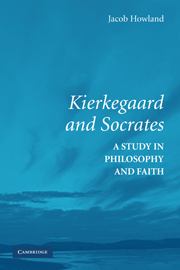Book contents
- Frontmatter
- Contents
- Note on Texts and Translations
- Acknowledgments
- Kierkegaard and Socrates
- Introduction
- 1 Johannes Climacus, Socratic Philosopher
- 2 Climacus's Thought-Project
- 3 Platonic Interlude: Eros and the God
- 4 Climacus's Poetical Venture
- 5 The Paradox and the Passion of Thought
- 6 Self-Love and Offense
- 7 Faith and the Contemporary Follower
- 8 Climacan Interlude: On Historical Necessity
- 9 The Follower at Second Hand and The Moral
- 10 Socrates in Postscript
- Epilogue: Kierkegaard on Christ and Socrates
- Works Cited
- Index
Epilogue: Kierkegaard on Christ and Socrates
Published online by Cambridge University Press: 01 December 2009
- Frontmatter
- Contents
- Note on Texts and Translations
- Acknowledgments
- Kierkegaard and Socrates
- Introduction
- 1 Johannes Climacus, Socratic Philosopher
- 2 Climacus's Thought-Project
- 3 Platonic Interlude: Eros and the God
- 4 Climacus's Poetical Venture
- 5 The Paradox and the Passion of Thought
- 6 Self-Love and Offense
- 7 Faith and the Contemporary Follower
- 8 Climacan Interlude: On Historical Necessity
- 9 The Follower at Second Hand and The Moral
- 10 Socrates in Postscript
- Epilogue: Kierkegaard on Christ and Socrates
- Works Cited
- Index
Summary
Kierkegaard mentions the name of Socrates in the Hong edition of his journals and papers well over two hundred times. Some of his remarks revolve around themes familiar from the pseudonymous works, such as Socrates' existential “proof” for the immortality of the soul, the significance of his example for the Christian dialectician, his exemplary use of indirect communication, his attention to the single individual, his negativity, and his emphasis on doing as the proper criterion of knowing. On other occasions, Kierkegaard reflects on the Socratic nature of his own task. “I wonder if it did not go with Socrates in his age as with me,” he muses in a typical entry. “He came to be regarded as representing evil, for in those days ignorance was looked upon as evil – and yet Socrates was in truth the physician.” Yet another significant set of entries explores Socrates' anticipation of Christian existence – a theme that is especially prominent in Kierkegaard's later years. “This Socratic thesis is of utmost importance for Christianity,” he writes in 1850:
Virtue cannot be taught; that is, it is not a doctrine, it is a being-able, an exercising, an existing [Existeren], an existential [existentiel] transformation, and therefore it is so slow to learn, not at all as simple and easy as the rote-learning of one more language or one more system. No, in respect to virtue there is always particular emphasis on the internal, the inward, “the single individual.”
- Type
- Chapter
- Information
- Kierkegaard and SocratesA Study in Philosophy and Faith, pp. 209 - 218Publisher: Cambridge University PressPrint publication year: 2006

